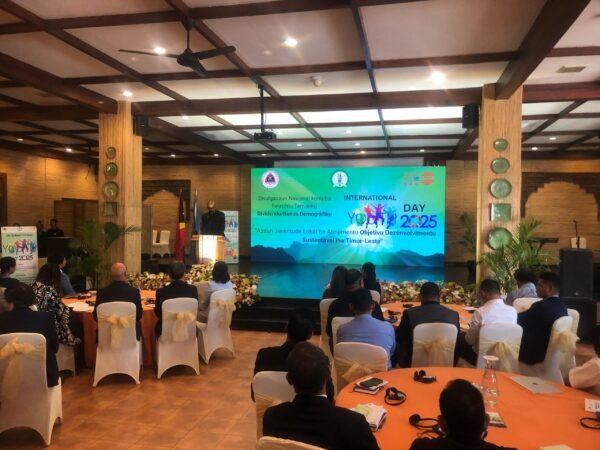Dili, August 13, 2025 (Média Democracia) – The Ministry of Youth, Sports, Arts and Culture (MJDAK), together with international partner the United Nations Population Fund (UNFPA), has launched the Demographic Dividend Monograph Report to commemorate International Youth Day. The launch was held at Hotel Timor on Monday.
Minister of Youth, Sports, Arts and Culture, Nelyo Isaac Sarmento, stated that today’s launch aimed to discuss youth matters and present statistics on the country’s young population.
“We are launching the Youth Demographic Dividend Monograph Report so that we can better understand youth statistics, because when we implement any youth-related program, we should take guidance from the actual objectives of sustainable development,” said Minister Nelyo Isaac Sarmento.
The Minister further explained that, with this opportunity, the Ministry, working in collaboration with international partner UNFPA, has carried out the launch so that everyone can know about the program.
“That is why we used this commemoration to launch the Youth Demographic Dividend Monograph, so that everyone is informed. For example, we can observe that many families have a large number of children, so moving forward we can create certain conditions for them,” Minister Sarmento added.
Looking at the period from 2002 until now, there are still many families with more than eight children. This is one of the challenges we face, how to plan better for such a situation so that in the future it can be reduced. From this launch, we can also understand that women are increasingly knowledgeable about economic matters and social issues. The Minister called on all leaders, civil society, and international organizations to include young people whenever activities are carried out.
Meanwhile, UNFPA Representative in Timor-Leste, Pamela Aine, said it was a great honor to mark International Youth Day and launch the Demographic Dividend Monograph, which was developed using data from Timor-Leste’s 2022 Population and Housing Census.
“Today we gather together to celebrate International Youth Day 2025, with the theme ‘From Local Youth Action to the SDGs and Beyond.’ This theme reflects the role of young people in transforming global goals into local progress in Timor-Leste. We see this every day in climate resilience action, digital innovation, creative storytelling, and leadership that shapes community life,” said UNFPA Technical Representative Pamela Aine.
She added that the monograph prioritizes youth in national development, reflecting a commitment aligned with global goals, including the UN’s youth strategies and the establishment of a global UN youth office. Priority continues to be given to youth engagement through skills development, civic participation, and volunteerism as local actors.
“Our collective efforts such as, government, young people, civil society, and development partners are focused on accelerating progress towards the Sustainable Development Goals and preparing our youth to take advantage of opportunities presented by Timor-Leste’s accession to ASEAN,” Pamela Aine said.
She emphasized that the concept of the demographic dividend refers to the potential for economic growth that can result from changes in a country’s age structure, when the working-age population (15–64 years) grows relative to dependents children and the elderly.
“This opens up opportunities if we ensure our young people are educated, healthy, skilled, and employed. The 2022 census tells us that over 70% of the population is under the age of 35, and nearly 52% are aged 14–24. This growth in youth numbers is not a challenge it is our advantage,” Pamela Aine stated.
She stressed that there are four key areas to advance youth participation and development: first, invest in education and skills, with priority on quality and inclusive learning, especially for girls and young women.
“We all know that in Timor-Leste there is a gender gap, with only one in four women participating in the labor force. We need gender-responsive policies that remove barriers and expand opportunities for women and girls,” she added.
She also noted the need to create jobs and support resilient entrepreneurship, which requires decent employment and meaningful livelihoods. This means investing in small and medium enterprises, digital skills, rural development, and climate-smart sectors, areas where youth can take the lead.
She explained that this monograph is not just a printed document but a springboard for action. She urged leaders, development partners, and the private sector to make greater investments in all youth, as a competitive advantage for the future.
Report: Nelfiano
Photo: Nelfiano

